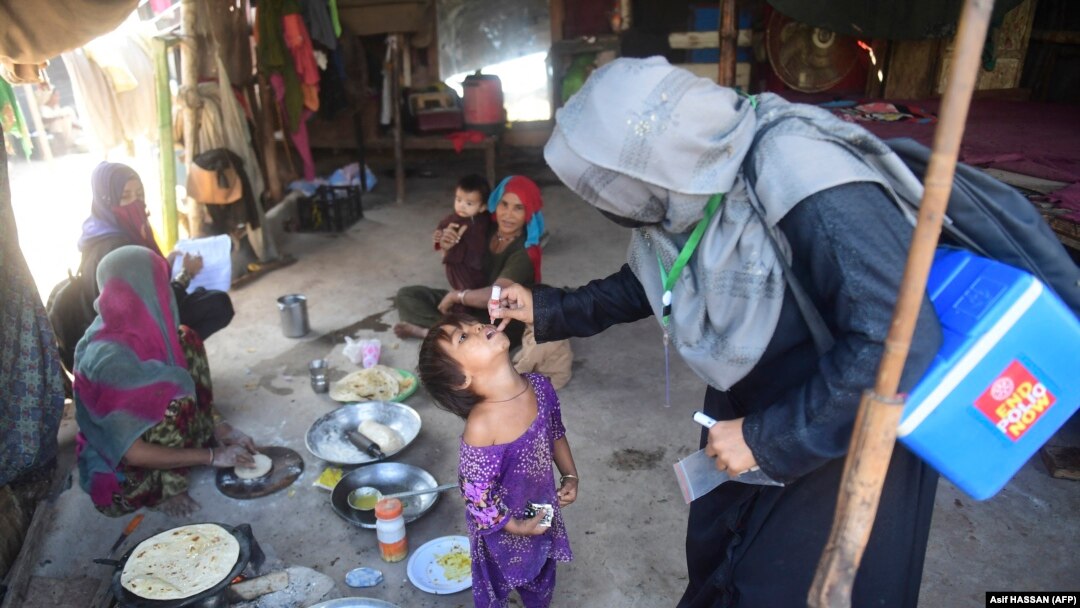Anti-polio campaigns, an uphill battle in Afghanistan and Pakistan
Worldwide, the virus, which can cause paralysis in infants and children, is unchecked only in these two countries. In Afghanistan, the Taliban no longer want door-to-door campaigns fearing for their own safety. In Pakistan workers continue to be victims of terrorist attacks and families are still very wary of vaccines.
Kabul (AsiaNews/Agencies) – After some reports indicated that the Taliban had suspended an ongoing anti-polio vaccination campaign, local sources noted that no official decree had been issued to that effect. Instead, the Taliban’s Ministry of Public Health said that it was willing to conduct the vaccination campaign in mosques rather than the door-to-door approach used so far.
Health experts warn that this risks undermining decades of efforts to eradicate the virus and might spark a new epidemic because most families in remote areas are unable to take their children to a mosque to get two doses of the vaccine. The latest data seem to bear this out.
Of the 18 cases detected this year (against 6 in 2023), 11 were in Kandahar, the Taliban’s main centre of power, where vaccinations have been conducted in mosques over the past few years due to restrictions on female workers.
“In the rest of Afghanistan, there are no issues with female polio workers and in those areas where we have female workers, we don’t have cases of polio," a local official told The Guardian.
Before the Taliban took power again in August 2021, women played a key role in vaccination campaigns, raising awareness among mothers and entering spaces forbidden to men.
For this reason, female staff have been allowed to continue working in the health sector, despite a series of other bans imposed by the Taliban on women's activities.
But in rural villages in the southern provinces, those bordering Pakistan, several women said they were forced to resign because of restrictions on their freedom.
This, however, is not the only reason that prompted the Taliban to review the vaccination campaign. “The reason behind the postponing of the anti-polio campaign is the issues with the modality of implementation,” the health official explained on condition of anonymity.
“The leadership of the current government has ordered us to not conduct door-to-door campaigns” for “security” reasons, the source added. “The south, especially Kandahar, is where the Taliban leaders live, and they are concerned the campaigns could reveal their locations to foreign threats.”
The Islamic State represents another threat. In recent years, the group has repeatedly targeted the centres of Taliban power for terrorist attacks.
In the past, US intelligence services used fake immunisation campaigns to track down terrorists, fuelling the population's mistrust. Religious clerics have also spread fake news.
Pakistan is the other country in the world along with Afghanistan where polio is still running unchecked among children and infants, spreading mainly via wastewater, causing irreversible paralysis in some cases.
Some 18 cases were reported this year in Pakistan, but the actual number is likely higher. Most infections were reported in Balochistan, a province on the border with Iran and Afghanistan. This is no coincidence.
Despite efforts by the Pakistani government, which last week recruited 286,000 health workers to vaccinate 33 million children under the age of five, two attacks against health workers and police personnel assigned to protect them have already been reported.
Tehreek-e-Taliban Pakistan (TTP), the Pakistani Taliban movement, and the Islamic State of Khorasan Province (IS-KP), who operate along the Afghan border, attacked polio teams because they suspect them to be government spies.
After unidentified gunmen killed a vaccinator and a policeman last week, police personnel went on strike to demand government action.
More than 200 people, mostly women, have lost their lives in attacks against anti-polio campaign workers in recent years.
But it is often families themselves who ask medical staff to record a vaccination that never took place due to mistrust of vaccines.
According to a study in Peshawar, for example, 79 per cent of parents did not want to vaccinate their children because they feared they include ingredients forbidden by their religion.
15/01/2009
19/08/2019 11:16
31/08/2021 11:19







.png)










